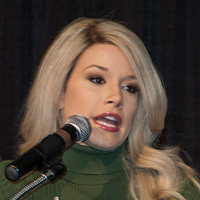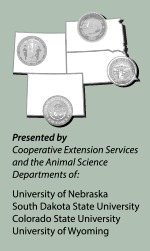Ag Advocacy on the Main Stage
2011 Miss America Teresa Scanlan used the national stage to promote American agriculture.
by Kasey Brown, associate editor, Angus Journal
RAPID CITY, S.D. (Dec. 5, 2013) — People need to understand the great privilege of a safe food supply. In developing countries, there is a direct correlation between agriculture infrastructure and their economic prosperity, said 2011 Miss America Teresa Scanlan. She spoke Dec. 5 to more than 500 attendees of the 23rd Range Beef Cow Symposium in Rapid City, S.D., about her experience as Miss America and having a national stage for her platform of agriculture.
 Teresa Scanlan shared her experience as Miss America the national stage it gave her promote agriculture.
Teresa Scanlan shared her experience as Miss America the national stage it gave her promote agriculture.Scanlan is the middle child of seven siblings from Gering, Neb. She was home-schooled and decided she wanted to go to law school. Naturally, with seven children, her dad told her she would need scholarships to do so, and that’s how she started with the Miss America contest. You can compete for seven years from age 17-24. She won at 17, the youngest ever, and said that her entire undergraduate degree and part of law school were completely paid for through her involvement in the Miss America competition.
What she enjoyed most about her involvement with the competition was having a platform and a microphone with which to speak. Being from a small town, she said she often lacked the credibility to really be heard. After winning the Miss America competition, more people cared about her thoughts and she had many more opportunities to speak.
Scanlan’s platform included three strategies to protect American agriculture:
- raising the next generation of farmers and ranchers, and involving younger generations,
- informing and educating the public on agriculture as a whole, and
- creating informed agricultural policy.
What struck her the most during her extensive travel was the lack of understanding and appreciation of agriculture. Americans spend 9.6% of their disposable income on food. The next closest country is Canada, with 16%, but affordable food is often taken for granted.
She gave an example that the first camera was added to a cell phone in 2004, which increased the amount of photos by tenfold. The company that actually invented the digital camera filed for bankruptcy recently.
“I say this to show what happens when companies can’t keep up with change and connect with their consumers,” she noted.
American agriculture has the technology to meet the growing population challenge. However, reaching out to consumers and politicians is equally as important. Her experience in Washington, D.C., and interest in politics revealed to her many politicians are well-meaning, but uninformed. Unfortunately, that results in unnecessary regulations.
“We need vocal advocates in Washington, and we need to support the groups who do advocate on agriculture’s behalf,” Scanlan recommended.
Additionally, reaching out to consumers and younger generations will also secure a strong future for American agriculture to change the many misconceptions about agriculture. First-hand experience on a farm or ranch help makes a bigger impact that solely speaking, she noted from her experience, but any type of conversation is beneficial.
Scanlan spoke Thursday at RBCS XXIII. Visit the Newsroom at www.rangebeefcow.com/2013 to listen to her presentation.
---------------------
The RBCS is a biennial educational symposium offering practical production management information. It is sponsored by the Cooperative Extension Service and animal science departments of the University of Wyoming, South Dakota State University, Colorado State University and the University of Nebraska.
Comprehensive coverage of the symposium is available online at www.rangebeefcow.com. Compiled by the Angus Journal editorial team, the site is made possible through sponsorship of LiveAuctions.tv and the cooperation of the host committee.
Editor’s Note: This article was written under contract or by staff of the Angus Journal. To request reprint permission and guidelines, contact Shauna Rose Hermel, editor, at 816-383-5270.


